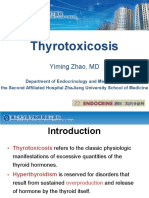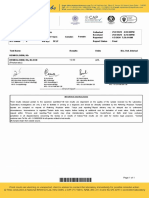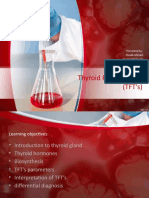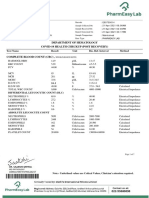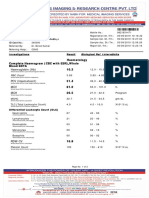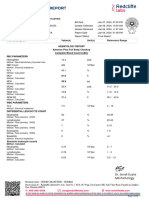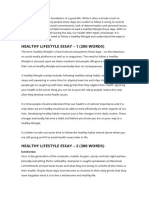1-Good Health Gold Package - PO2257496339-951
1-Good Health Gold Package - PO2257496339-951
Uploaded by
Aafaq BhuttoCopyright:
Available Formats
1-Good Health Gold Package - PO2257496339-951
1-Good Health Gold Package - PO2257496339-951
Uploaded by
Aafaq BhuttoOriginal Description:
Original Title
Copyright
Available Formats
Share this document
Did you find this document useful?
Is this content inappropriate?
Copyright:
Available Formats
1-Good Health Gold Package - PO2257496339-951
1-Good Health Gold Package - PO2257496339-951
Uploaded by
Aafaq BhuttoCopyright:
Available Formats
PO No :PO2257496339-951
Name : Ms.MARIYAM BHUTTO Order ID : 4512549
Age/Gender : 22/Female Registration Date : 18-Apr-22 12:18 PM
Patient ID : HYD23807 Collection Date : 18/Apr/2022 11:31AM
Barcode ID : A6427457 Sample Receive Date : 18/Apr/2022 01:32PM
Referred By : Dr. Report Status : Final Report
Sample Type : Serum Report Date : 18/Apr/2022 05:06PM
Immunology
GOOD HEALTH GOLD PACKAGE
Test Name Result Unit Bio. Ref. Range Method
Thyroid Profile
T3, Total 1.0 ng/mL 0.60 - 1.81 CLIA
T4, Total 6.5 µg/dl 5.5 - 11.0 CLIA
Thyroid Stimulating Hormone - Ultra 7.155 uIU/ml 0.55 - 4.78 CLIA
Sensitive
Pregnancy Reference Ranges:
1st trimester 0.1–2.5
2nd trimester 0.2–3.0
3rd trimester 0.3–3.0
Comment:
Thyroid dysfunction is common in the general population and Laboratory tests are essential for the accurate diagnosis and cost-effective monitoring of thyroid
dysfunction. TSH is now firmly established as the first-line thyroid function test to assess thyroid status for most clinical conditions. Interpretation of the results of
thyroid function tests is facilitated by an understanding of thyroid hormone physiology, especially the normal inverse relationship between free T4 and TSH
concentrations.Changes in thyroid status are normally associated with concordant changes in T3,T4 and TSH concentrations (e.g. raised T4 and T3 with suppressed TSH
in thyrotoxicosis; low T4 and T3 with elevated TSH in hypothyroidism). An abnormal TSH requires further investigation, including measurement of free T4 . In most
clinical situations involving discordant FT4 and TSH results, the TSH test usually yields the most diagnostically reliable result, provided that the patient is not receiving
medications that directly inhibit TSH secretion, and there are no conditions affecting the pituitary-thyroid axis.. Using TSH as a single criterion has been shown to
accurately classify the thyroid state of a patient in over 95% of cases. Non-thyroidal illness (NTI), pituitary disease and various drugs can all affect the axis and cause
discrepancies between TSH levels, thyroid hormone levels and the clinical state. Measurement of the TSH level is indicated for patients with symptoms suggestive of
thyroid dysfunction, reduced bone mineral density, dyslipidaemia, depression, or atrial fibrillation.
Total T4 measures the total amount of thyroxine circulating in the bloodstream. Indications:Used to make diagnosis of underactive or overactive thyroid when TSH is
abnormal • Used with TSH for monitoring patients with Graves’ disease • Newborn screening test for hypothyroidism • Fairly accurate in patients with no protein
abnormalities and not pregnant Free T4 measures the available, unbound amount of thyroxine in the bloodstream.
Free T4 is critical for evaluating patients with hypothalamic-pituitary disease. It is also useful for evaluating the response to levothyroxine in cases of poor compliance
and in the first months of treating patients with chronic, severe hypothyroidism.
The total T3 test measures the total amount of triiodothyronine circulating in the bloodstream. Free T3 measures the free, unbound levels of the hormone
triiodothyronine available for use by the body.Total T3 measurements, however, should be performedIn patients suspected of having T3 thyrotoxicosis and in patients
taking drugs that inhibit the peripheral conversion of T4 to T3 (such as dexamethasone, propranolol, propylthiouracil, amiodarone, and iodine-containing contrast
media)
Maternal hypothyroidism causes adverse effects on fetal psychomotor development, highlighting the significance of evaluating thyroid function during pregnancy.Tests
should be performed pre-pregnancy or in the first trimester with TSH tests that can detect mild thyroid failure. During pregnancy, the total levels of T3 and T4 are high
Kindly correlate clinically
Results relate only to the sample, as received
Page 10 of 13
You might also like
- Acut - Lymphoid LukemiaDocument28 pagesAcut - Lymphoid LukemiaAya AlntshNo ratings yet
- KER48201059583796394Document3 pagesKER48201059583796394fahad fahadNo ratings yet
- PHD Thesis Khairy ElsayedDocument317 pagesPHD Thesis Khairy ElsayedCarlos Antonio Ribeiro100% (1)
- Lab Report NewDocument2 pagesLab Report Newnsdh5v5v5sNo ratings yet
- Deepika.R:::: Patient Age / Sex 26 Y / Female BranchDocument2 pagesDeepika.R:::: Patient Age / Sex 26 Y / Female BranchkannanNo ratings yet
- SaritaDocument2 pagesSaritaPushpanjaliNo ratings yet
- Thyroid Tests and ResultsDocument9 pagesThyroid Tests and ResultsKristel BelgicaNo ratings yet
- Variations, Errors, and QualityDocument46 pagesVariations, Errors, and QualityJohn Reden RomeroNo ratings yet
- ThyrotoxicosisDocument105 pagesThyrotoxicosisAli Murtaza Abbas100% (1)
- LPLT12507 : LPL - Lpl-Rohini (National Reference Lab) Sector - 18, Block - E Rohini DELHI 110085Document1 pageLPLT12507 : LPL - Lpl-Rohini (National Reference Lab) Sector - 18, Block - E Rohini DELHI 110085Archana YadavNo ratings yet
- Diagnosis of HypothyroidismDocument10 pagesDiagnosis of HypothyroidismHanzla IrfanNo ratings yet
- Thyroid Profile (Total T3, Total T4, TSH), Serum: EcliaDocument3 pagesThyroid Profile (Total T3, Total T4, TSH), Serum: EcliaRoopa gowdaNo ratings yet
- TPO in PregnancyDocument18 pagesTPO in PregnancyRoxana TudorNo ratings yet
- Thyroid Disorders (Final Draft)Document17 pagesThyroid Disorders (Final Draft)mogesie1995No ratings yet
- Gds137 Slide HyperthyroidismDocument30 pagesGds137 Slide HyperthyroidismLouie Kem Anthony BabaranNo ratings yet
- Pemeriksaaan Laboratorium Kelainan Thyroid: DR - Budi Dermawan Lubis, SPPK DR - Siti Hajar, M.Ked, SPPKDocument12 pagesPemeriksaaan Laboratorium Kelainan Thyroid: DR - Budi Dermawan Lubis, SPPK DR - Siti Hajar, M.Ked, SPPKBonitavanyNo ratings yet
- Shivani Lab ReportDocument2 pagesShivani Lab ReportJames MooreNo ratings yet
- Thyroid DX PXLDocument62 pagesThyroid DX PXLabduljebarNo ratings yet
- Thyroid GlandDocument49 pagesThyroid Glandjuliefe pinionNo ratings yet
- Hyperthyroidsm: EpidemiologyDocument6 pagesHyperthyroidsm: EpidemiologyEllieNo ratings yet
- Endocrine 160110083024Document65 pagesEndocrine 160110083024Ryan CracknellNo ratings yet
- Final: L16 - Bhopal 6 - CC Shop No.10, Shakti Nagar Shopping Complex, Shakti Nagar, Bhopal-4 BHOPAL 462024Document1 pageFinal: L16 - Bhopal 6 - CC Shop No.10, Shakti Nagar Shopping Complex, Shakti Nagar, Bhopal-4 BHOPAL 462024Lalita KacherNo ratings yet
- CHN1 Health Care Delivery System2Document22 pagesCHN1 Health Care Delivery System2MicaNo ratings yet
- LPL - Paschim Vhr-Iv Dr. Umesh Mittal, House No - 233, Block A-5 DelhiDocument1 pageLPL - Paschim Vhr-Iv Dr. Umesh Mittal, House No - 233, Block A-5 DelhiSupriya Sukheja100% (1)
- FunctionTests Brochure PDFDocument2 pagesFunctionTests Brochure PDFArslan SaleemNo ratings yet
- Fever Panel BasicDocument7 pagesFever Panel BasicMadNo ratings yet
- Complete Blood Picture: Clincal Pathology Consultant DR - Khaled AbdellahDocument3 pagesComplete Blood Picture: Clincal Pathology Consultant DR - Khaled Abdellahmahmoudahmed2660No ratings yet
- Thyroid Function Test (TFT'S) : Presented By: Shoaib Ahmad Usama Maqsood Kamran AnjumDocument52 pagesThyroid Function Test (TFT'S) : Presented By: Shoaib Ahmad Usama Maqsood Kamran AnjumpriyaNo ratings yet
- The Role of Maternal Thyroid Status On Pregnancy Outcome For Motherand NewbornDocument36 pagesThe Role of Maternal Thyroid Status On Pregnancy Outcome For Motherand NewbornRahmayantiYuliaNo ratings yet
- R3Document1 pageR3Asif ButtNo ratings yet
- Efbu2630Document4 pagesEfbu2630Aniruddh NagaNo ratings yet
- Thyroid Disorders: A Practical ApproachDocument26 pagesThyroid Disorders: A Practical ApproachSadashivayya SoppimathNo ratings yet
- VivaChek Company Introduction Updated Oct 2016 (En)Document16 pagesVivaChek Company Introduction Updated Oct 2016 (En)Malik AlnabhaniNo ratings yet
- D-35, Gr. Floor, Moti Nagar, Nr. Acharya Bhikshu Hospital, New Delhi - 110015Document15 pagesD-35, Gr. Floor, Moti Nagar, Nr. Acharya Bhikshu Hospital, New Delhi - 110015Shivam AroraNo ratings yet
- Lab Report NewDocument2 pagesLab Report NewrakeshahlNo ratings yet
- S14 - FPSC Rakesh Marg J-3, Pushpanjali Complex, Nehru Nagar Rakesh Marg, Ghaziabad-Utp, IndDocument2 pagesS14 - FPSC Rakesh Marg J-3, Pushpanjali Complex, Nehru Nagar Rakesh Marg, Ghaziabad-Utp, Indvijay rastogiNo ratings yet
- L42 - LPL Vasundhra GRND Floor, Commercial Premises Viz15c/20 Phone No-0120-3988505 GHAZIABAD 201012Document3 pagesL42 - LPL Vasundhra GRND Floor, Commercial Premises Viz15c/20 Phone No-0120-3988505 GHAZIABAD 201012Utkarsh GuptaNo ratings yet
- Routine Urine ExaminationDocument1 pageRoutine Urine ExaminationMayur ParmarNo ratings yet
- Krishan Lal PDFDocument10 pagesKrishan Lal PDFAyub AlamNo ratings yet
- Blood Gas and Critical Care Analyte Analysis: Chapter ObjectivesDocument24 pagesBlood Gas and Critical Care Analyte Analysis: Chapter ObjectivesC LNo ratings yet
- Department of Hematology Covid-19 Health Checkup (Post Recovery)Document8 pagesDepartment of Hematology Covid-19 Health Checkup (Post Recovery)Geetika GuptaNo ratings yet
- Report Geeti PaulDocument22 pagesReport Geeti PaulSAIKAT PAULNo ratings yet
- Q8Pro POCTDocument16 pagesQ8Pro POCTSmart BiomedicalNo ratings yet
- Echo and ECG ReportDocument3 pagesEcho and ECG Reportpsahu74No ratings yet
- REPORTDocument2 pagesREPORTCORE 21No ratings yet
- CLL PatientReportDocument1 pageCLL PatientReportabdullahqqNo ratings yet
- Goiter and Malignant Thyroid DiseaseDocument24 pagesGoiter and Malignant Thyroid Diseaseshaza ewisNo ratings yet
- Laboratory Test Report: Test Name Result Biological Reference Interval Glycosylated HaemoglobinDocument3 pagesLaboratory Test Report: Test Name Result Biological Reference Interval Glycosylated HaemoglobinSri ShivaNo ratings yet
- ReportDocument19 pagesReportpparmar871No ratings yet
- Dengue NS1Document1 pageDengue NS1raj100% (1)
- 001 210000535 CT0 117 2Document1 page001 210000535 CT0 117 2Omer PervezNo ratings yet
- Guidelines of The American Thyroid Association PREGNANCY PDFDocument47 pagesGuidelines of The American Thyroid Association PREGNANCY PDFIqra AnugerahNo ratings yet
- Pathcare Labs Pvt. LTD.: Obtained ValueDocument12 pagesPathcare Labs Pvt. LTD.: Obtained ValueVaibhav ManglaNo ratings yet
- Investigation Observed Value Unit Biological Reference Interval CRP - C Reactive Protein 14.25Document2 pagesInvestigation Observed Value Unit Biological Reference Interval CRP - C Reactive Protein 14.25Sandip VaghelaNo ratings yet
- Dipanwita94@gmail - Com 20160127134036 PDFDocument3 pagesDipanwita94@gmail - Com 20160127134036 PDFdipanwitaNo ratings yet
- Jotsna Meshram PDFDocument1 pageJotsna Meshram PDFYashNo ratings yet
- Patient Name Mr. B K Jha Uhid Lab No Sample Date Receiving Date 29/12/2021 12:11PMDocument2 pagesPatient Name Mr. B K Jha Uhid Lab No Sample Date Receiving Date 29/12/2021 12:11PMron fratomNo ratings yet
- S61 - Lpl-Hanuman Road (Main Lab) Eskay House, 54, Hanuman ROAD, NEW DELHI - 110001 DelhiDocument2 pagesS61 - Lpl-Hanuman Road (Main Lab) Eskay House, 54, Hanuman ROAD, NEW DELHI - 110001 DelhiElvisPresliiNo ratings yet
- MMMKDocument1 pageMMMKRam narayanNo ratings yet
- Laboratory Test Report: Test Name Result Biological Reference Interval Total T3Document3 pagesLaboratory Test Report: Test Name Result Biological Reference Interval Total T3Chandu Chan LyristNo ratings yet
- Thyroid Profile (T3, T4, TSH), Serum: MRS.G SunithaDocument1 pageThyroid Profile (T3, T4, TSH), Serum: MRS.G Sunithamamindla rameshNo ratings yet
- A Student Apprenticeship ProgramDocument10 pagesA Student Apprenticeship ProgramMitzie JealineNo ratings yet
- Rephrases: Page - 1Document11 pagesRephrases: Page - 1Diana TudorNo ratings yet
- Mensuration and Mensuration Formulas PDFDocument5 pagesMensuration and Mensuration Formulas PDFHarsh GuptaNo ratings yet
- Module 5 Verification and Validation of Simulation ModelsDocument15 pagesModule 5 Verification and Validation of Simulation ModelsPradyumna A KubearNo ratings yet
- 22 Simple Tips To Make A Guy Fall Crazily in Love With YouDocument27 pages22 Simple Tips To Make A Guy Fall Crazily in Love With Yousakshi agarwal100% (2)
- Sonnet 29 Detailed Lesson PlanDocument7 pagesSonnet 29 Detailed Lesson PlanAte Anjie67% (3)
- Letters To Gail TwoDocument242 pagesLetters To Gail Twoiii100% (2)
- Pygmalion in ManagementDocument10 pagesPygmalion in ManagementShivam Bose100% (1)
- Non Insti Cor AdDocument141 pagesNon Insti Cor AdJohn Bernardo100% (1)
- 02 Punch CH 02Document22 pages02 Punch CH 02Jarallah Ali JarallahNo ratings yet
- Ni-284-1 Lot#6 036108-10 - WDocument1 pageNi-284-1 Lot#6 036108-10 - WboroumandNo ratings yet
- Quiz 2 Review Sheet: 6.101 Analog Electronics Lab March 19, 2007Document3 pagesQuiz 2 Review Sheet: 6.101 Analog Electronics Lab March 19, 2007VIJAYPUTRANo ratings yet
- Five Ways To Kill A Man THEME AND ANALYSISDocument5 pagesFive Ways To Kill A Man THEME AND ANALYSISVishrut Bls100% (1)
- British Literature - WikipediaDocument219 pagesBritish Literature - Wikipediahamedbaikoro34No ratings yet
- Variations in The Natural Chemical Concentration of River Water During Flood Flows, and The Lag EffectDocument8 pagesVariations in The Natural Chemical Concentration of River Water During Flood Flows, and The Lag EffectjcmqqujwNo ratings yet
- Cognitve Behavioral Therapy Training in Core Skills Presentation NASBHCDocument41 pagesCognitve Behavioral Therapy Training in Core Skills Presentation NASBHCNadiaNo ratings yet
- ORGS 1136 - Week 3, Chapter 3 Notes ORGS 1136 - Week 3, Chapter 3 NotesDocument3 pagesORGS 1136 - Week 3, Chapter 3 Notes ORGS 1136 - Week 3, Chapter 3 NotesTara FGNo ratings yet
- Project Proposal On: - Online Health Insurance Information Management System in Worabe CityDocument15 pagesProject Proposal On: - Online Health Insurance Information Management System in Worabe Cityseid mohammed100% (1)
- Clientele & Audiences in Social WorkDocument6 pagesClientele & Audiences in Social WorkIssaVillanuevaNo ratings yet
- Data Mining: Concepts and TechniquesDocument59 pagesData Mining: Concepts and TechniquesdivyaNo ratings yet
- 01 Activity 1Document2 pages01 Activity 1Elnel TolibasNo ratings yet
- DTS Anytime 3 Important Stages Module 1 2022Document1 pageDTS Anytime 3 Important Stages Module 1 2022nyashachiutsiNo ratings yet
- Ra 8491 Flag and Heraldic Code of The PhilippinesDocument15 pagesRa 8491 Flag and Heraldic Code of The PhilippinesLeon Odarniem Saniraf EtelpNo ratings yet
- 1 Write The Plural Form For Each of These Singular Nouns. 2 Choose The Correct Answer. 1 All My Friends Are Good ChildrenDocument2 pages1 Write The Plural Form For Each of These Singular Nouns. 2 Choose The Correct Answer. 1 All My Friends Are Good ChildrenYamileth ValdesNo ratings yet
- A Healthy Lifestyle Is The Foundation of A Good LifeDocument11 pagesA Healthy Lifestyle Is The Foundation of A Good LifeCarlos Juan Pérez Leiter100% (1)
- Trainee'S Record Book: Technical Education and Skills Development AuthorityDocument10 pagesTrainee'S Record Book: Technical Education and Skills Development AuthorityVirgil Keith Juan PicoNo ratings yet
- Real Number Sys-WPS OfficeDocument15 pagesReal Number Sys-WPS OfficeCali Shandy H.100% (1)
- Indefeasibility of TitleDocument53 pagesIndefeasibility of TitleFatin Nabila100% (1)
- The Keys of The Kingdom of HeavenDocument15 pagesThe Keys of The Kingdom of HeavenMelanny Capili Angangan100% (2)








